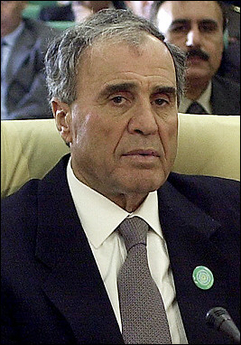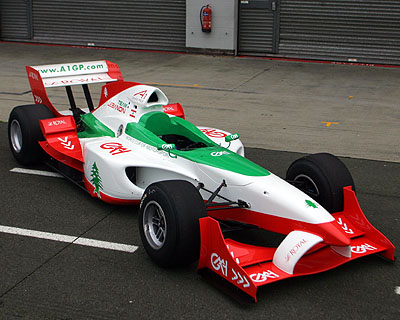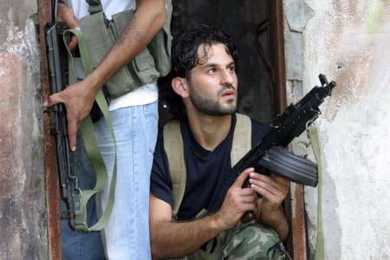 Oct 12 (Reuters) - Syrian Interior Minister Ghazi Kanaan, said by Syria's state news agency to have committed suicide on Wednesday, long served as the top enforcer of his country's policies in Lebanon. Kanaan was interviewed last month by a U.N. team probing the Feb. 14 assassination of former Lebanese Prime Minister Rafik al-Hariri. Chief U.N. investigator Detlev Mehlis is expected to submit his report to Secretary-General Kofi Annan on Oct. 21.
Oct 12 (Reuters) - Syrian Interior Minister Ghazi Kanaan, said by Syria's state news agency to have committed suicide on Wednesday, long served as the top enforcer of his country's policies in Lebanon. Kanaan was interviewed last month by a U.N. team probing the Feb. 14 assassination of former Lebanese Prime Minister Rafik al-Hariri. Chief U.N. investigator Detlev Mehlis is expected to submit his report to Secretary-General Kofi Annan on Oct. 21.
Here is a chronology of events in Lebanon since Hariri's death. Feb. 14, 2005 - Hariri is killed by truck bomb in Beirut. Feb. 16 - At least 150,000 Lebanese turn Hariri's funeral into outpouring of anger against Syria.Feb. 28 - Pro-Syrian Prime Minister Omar Karami resigns. March 5 - President Bashar al-Assad tells Syrian parliament that his troops will start phased pullout from Lebanon. March 8 - Lebanese flood central Beirut for pro-Syrian rally organised by Hizbollah guerrilla group. Syrian troops begin redeploying. March 10 - Karami reappointed to form government. March 14 - Anti-Syrian protesters stage biggest demonstration since Hariri's killing.March 19 - Bomb in Christian suburb of Beirut wounds 11. March 23 - Bomb kills three people in Christian town of Kaslik north of Beirut. April 7 - U.N. Security Council orders international investigation into Hariri's assassination. April 13 - Karami resigns after failing to form cabinet. April 15 - President Emile Lahoud appoints moderate Syrian ally Najib Mikati as prime minister. April 19 - Mikati forms government. April 25 - Pro-Syrian Lebanese security chief Jamil al-Sayyed resigns.
TRIPOLI, 10 Oct 2005 (IRIN) - Some Lebanese have become so poor they have decided to move into the crowded camps that house 400,000 Palestinian refugees in Lebanon.There at least housing is cheaper. They can also piggy-back off free education, healthcare and drinking water provided by the United Nations for the camps
 A1 Team Lebanon was out on track for qualifying today at the A1 Grand Prix of Nations EuroSpeedway. The demands of a new car and new engine required the team to devote track time to the technical demands from Zytek, with regard to the engine, and Lola for the chassis. This focus was reflected in the final qualifying times with Khalil Beschir lining up 24th on the grid.A1 Team Lebanon started the EuroSpeedway race weekend with a new A1 racing car, following Beschir's accident during the Feature race at Brands Hatch, England. The new car required a series of technical procedures to be completed during the practice sessions and the team devoted most of its track time in free practice concentrating on these. Khalil Beschir drove the car in first practice and with the limited time available for car setup, A1 Team Lebanon elected to optimize this with Beschir continuing to drive throughout the weekend. Team mate, Basil Shaaban, on hand at EuroSpeedway took the opportunity to join the Al Jazeera commentary team for the qualifying session adding a driver perspective for television viewers in the Arab world. The A1 Grand Prix qualifying format requires drivers to make four flying laps, within four 15 minute qualifying segments, with the best two times aggregated to produce the overall qualifying position. A1 Team Lebanon posted four good lap times, improving with each run, and with Beschir's aggregate time less than three seconds off the pole sitter.
A1 Team Lebanon was out on track for qualifying today at the A1 Grand Prix of Nations EuroSpeedway. The demands of a new car and new engine required the team to devote track time to the technical demands from Zytek, with regard to the engine, and Lola for the chassis. This focus was reflected in the final qualifying times with Khalil Beschir lining up 24th on the grid.A1 Team Lebanon started the EuroSpeedway race weekend with a new A1 racing car, following Beschir's accident during the Feature race at Brands Hatch, England. The new car required a series of technical procedures to be completed during the practice sessions and the team devoted most of its track time in free practice concentrating on these. Khalil Beschir drove the car in first practice and with the limited time available for car setup, A1 Team Lebanon elected to optimize this with Beschir continuing to drive throughout the weekend. Team mate, Basil Shaaban, on hand at EuroSpeedway took the opportunity to join the Al Jazeera commentary team for the qualifying session adding a driver perspective for television viewers in the Arab world. The A1 Grand Prix qualifying format requires drivers to make four flying laps, within four 15 minute qualifying segments, with the best two times aggregated to produce the overall qualifying position. A1 Team Lebanon posted four good lap times, improving with each run, and with Beschir's aggregate time less than three seconds off the pole sitter.
The Lebanese authorities set up check-points around two PFLP-GC bases - one on the Naameh Hills outside Beirut, and another in the Western Bekaa Valley near the Syrian border - after receiving information the Syrians were smuggling arms to the group's centers. The Syrian forces withdrew from Lebanon in late April after more than 20 years following popular and international pressure. Popular Front for the Liberation of Palestine representative Marwan Abdul Aal described the talks with Siniora as a "big message of assurances," saying the meeting was "positive and there was a lot of understanding."  BEIRUT, Lebanon (UPI)-- Lebanese Prime Minister Fouad Siniora Saturday launched a dialogue with the Palestinian groups in his country to ease rising tension between the two sides. Siniora met with a delegation representing the Palestine Liberation Organization before holding talks with representatives of various pro-Syrian factions in Lebanon. The talks came following tension between the two sides after the Popular Front for the Liberation of Palestine - General Command accused the Lebanese authorities of "tightening the grip" around its bases outside the 12 Palestinian refugee camps.
BEIRUT, Lebanon (UPI)-- Lebanese Prime Minister Fouad Siniora Saturday launched a dialogue with the Palestinian groups in his country to ease rising tension between the two sides. Siniora met with a delegation representing the Palestine Liberation Organization before holding talks with representatives of various pro-Syrian factions in Lebanon. The talks came following tension between the two sides after the Popular Front for the Liberation of Palestine - General Command accused the Lebanese authorities of "tightening the grip" around its bases outside the 12 Palestinian refugee camps.
Khazen History


Historical Feature:
Churches and Monasteries of the Khazen family

St. Anthony of Padua Church in Ballouneh
Mar Abda Church in Bakaatit Kanaan
Saint Michael Church in Bkaatouta
Saint Therese Church in Qolayaat
Saint Simeon Stylites (مار سمعان العامودي) Church In Ajaltoun
Virgin Mary Church (سيدة المعونات) in Sheilé
Assumption of Mary Church in Ballouneh
1 - The sword of the Maronite Prince
2 - LES KHAZEN CONSULS DE FRANCE
3 - LES MARONITES & LES KHAZEN
4 - LES MAAN & LES KHAZEN
5 - ORIGINE DE LA FAMILLE
Population Movements to Keserwan - The Khazens and The Maans
ما جاء عن الثورة في المقاطعة الكسروانية
ثورة أهالي كسروان على المشايخ الخوازنة وأسبابها
Origins of the "Prince of Maronite" Title
Growing diversity: the Khazin sheiks and the clergy in the first decades of the 18th century
Historical Members:
Barbar Beik El Khazen [English]
Patriach Toubia Kaiss El Khazen(Biography & Life Part1 Part2) (Arabic)
Patriach Youssef Dargham El Khazen (Cont'd)
Cheikh Bishara Jafal El Khazen
Patriarch Youssef Raji El Khazen
The Martyrs Cheikh Philippe & Cheikh Farid El Khazen
Cheikh Nawfal El Khazen (Consul De France)
Cheikh Hossun El Khazen (Consul De France)
Cheikh Abou-Nawfal El Khazen (Consul De France)
Cheikh Francis Abee Nader & his son Yousef
Cheikh Abou-Kanso El Khazen (Consul De France)
Cheikh Abou Nader El Khazen
Cheikh Chafic El Khazen
Cheikh Keserwan El Khazen
Cheikh Serhal El Khazen [English]
Cheikh Rafiq El Khazen [English]
Cheikh Hanna El Khazen
Cheikha Arzi El Khazen
Marie El Khazen